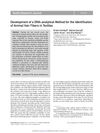 February 2024 in “Curēus”
February 2024 in “Curēus” Prompt diagnosis and treatment of hair tourniquet syndrome involving the uvula are crucial to prevent severe complications.
 February 2024 in “Animals”
February 2024 in “Animals” Giving selenium yeast to pregnant goats leads to better hair growth and cashmere quality in their babies.

A portable imaging system shows promise for diagnosing skin diseases and checking laser treatment effects.
 June 2023 in “Medeniyet medical journal”
June 2023 in “Medeniyet medical journal” People with alopecia areata have similar retinal structures but thicker choroidal regions compared to those without the condition.

Seborrheic dermatitis and dandruff are often treated with antifungal and anti-inflammatory medications, which can reduce symptoms and yeast growth on the scalp.
 January 2021 in “Figshare”
January 2021 in “Figshare” Melatonin helps Cashmere goat hair follicles grow by affecting stem cell signals and the surrounding microenvironment.

Researchers developed a method to identify and measure different animal hair fibers in textiles, successfully distinguishing materials like cashmere from cheaper fibers.
 January 2018 in “Indian Dermatology Online Journal”
January 2018 in “Indian Dermatology Online Journal” Trichoscopy can help tell the difference between artificial hair fibers and other scalp artifacts.
January 2018 in “Figshare” Melatonin helps Cashmere goats grow more hair by affecting genes and cell signals important for hair and blood vessel development.
January 2018 in “Figshare” Melatonin helps Cashmere goat hair follicles grow by affecting genes and cell signals important for their development and environment.
 August 2016 in “International journal of scientific research in science, engineering and technology”
August 2016 in “International journal of scientific research in science, engineering and technology” Adding human hair fibers to soft soil makes it stronger and prevents cracking.

Grateloupia elliptica seaweed extract may promote hair growth by activating Wnt/β-catenin signaling and cell proliferation.
 January 2016 in “Korean Journal of Pharmacognosy”
January 2016 in “Korean Journal of Pharmacognosy” Grateloupia elliptica, a type of marine algae, may promote hair growth by activating a specific cell growth pathway.
Wheat bran promotes hair growth by helping hair cells multiply.
April 1986 in “CRC Press eBooks” Hair color is determined by melanins produced in hair cells.
 391 citations,
November 2015 in “Journal of Clinical Lipidology”
391 citations,
November 2015 in “Journal of Clinical Lipidology” The guidelines suggest lifestyle changes, diet adjustments, and personalized medication to manage dyslipidemia and reduce heart disease risk.
 321 citations,
December 2009 in “Journal of Dermatological Science”
321 citations,
December 2009 in “Journal of Dermatological Science” Dermal cells are key in controlling hair growth and could potentially be used in hair loss treatments, but more research is needed to improve hair regeneration methods.
 277 citations,
June 2003 in “The journal of investigative dermatology. Symposium proceedings/The Journal of investigative dermatology symposium proceedings”
277 citations,
June 2003 in “The journal of investigative dermatology. Symposium proceedings/The Journal of investigative dermatology symposium proceedings” Epithelial-mesenchymal interactions control hair growth cycles through specific molecular signals.
 120 citations,
November 2014 in “Biological Reviews”
120 citations,
November 2014 in “Biological Reviews” The telogen phase of hair growth is active and important for preparing hair follicles for regeneration, not just a resting stage.
 117 citations,
November 2006 in “Experimental Dermatology”
117 citations,
November 2006 in “Experimental Dermatology” The article concludes that the wool follicle is a valuable model for studying tissue interactions and has potential for genetic improvements in wool production.
85 citations,
October 2007 in “International Journal of Dermatology” Curly hair shape is due to uneven growth patterns in the hair follicle.
 68 citations,
December 1991 in “Annals of the New York Academy of Sciences”
68 citations,
December 1991 in “Annals of the New York Academy of Sciences” Hair growth can be induced by certain cells found at the base of hair follicles, and these cells may also influence hair development and regeneration.
57 citations,
August 1999 in “Archives of dermatology” Hair follicles grow hair and release it through the skin.
55 citations,
December 2021 in “BMC Veterinary Research” Certain genes in Iranian sheep are linked to wool production and heat adaptation.
 46 citations,
May 2012 in “Molecular and Cellular Endocrinology”
46 citations,
May 2012 in “Molecular and Cellular Endocrinology” Human skin produces sex hormones like estrogen and testosterone, influenced by ARO and StAR, which may affect skin elasticity and hair growth.
 46 citations,
January 2009 in “Textile Research Journal”
46 citations,
January 2009 in “Textile Research Journal” Researchers developed a new method to identify animal hair in textiles, which is effective for various fibers and more reliable than previous methods.
42 citations,
January 2005 in “Applied spectroscopy” Hair from breast cancer patients shows changes in structure and composition, and a test using these changes detected cancer but also falsely identified some healthy samples as cancerous.
33 citations,
July 2007 in “Journal of cell science” Miz1 is essential for proper hair structure and growth.
32 citations,
June 2021 in “Frontiers in Pharmacology” The hydrogel speeds up burn wound healing and promotes tissue regeneration.
27 citations,
July 1997 in “PubMed” The harlequin ichthyosis mouse mutation causes thick skin and early death, resembling a human skin disorder.



















